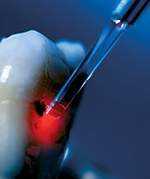Prophylaxis at the dentist: What costs the dental seal?

The sealing of permanent teeth helps to reduce tooth decay. But what does this measure cost and does the health insurance cover the costs? We answer these and other questions in an interview with the cost check expert.
What are tooth fissures?
Check cost: The fissures and pits that run between the larger cusps are called tooth fissures. Since the fissures are often finer than the bristles of the toothbrush, they are problematic to clean. Caries bacteria can settle, fissure caries is the result. Especially in the first two years after the breakthrough, the side and molar teeth are very susceptible to caries.
How much does the dental seal cost??
Cost check: Unfortunately, the statutory health insurers participate only in the costs incurred by a fissure seal of the molars in children and adolescents up to the age of 18:
| persons | costs |
|---|---|
| Children up to 18 years | The fissure seal of the large molars (molars) are taken over by the health insurance. The costs of sealing the small molars (premolars) are to be paid out of pocket. For this, you must spend 15 – 40 EUR per tooth. |
| Adults | 15 to 40 euros per tooth |

Even children’s teeth can be sealed Even in children and adolescents are the Costs in the amount of 15 to 40 EUR per tooth, for a sealing of the small jaws, corner and cutting teeth, not taken over by the legal health insurers. However, some companies grant a grant, as the effectiveness of this measure is considered proven.
If you have a dental insurance, this is often the case in adults for the cost of dental sealing on. Whether and to what extent this is the case can be found in the insurance conditions.
At what age are dental seals useful?
Check cost: As a rule, this prophylactic measure is made between the ages of 7 and 17. The tooth surface can be treated as soon as the permanent tooth is broken. The treatment should be done as soon as possible, because as soon as more than superficial enamel caries has settled, no more sealing is allowed.
When does a dental seal make sense, even if it has to be paid for itself?
Check cost: A fissure seal is advisable with:
- Teeth that have a difficult to care for, unfavorable surface structure.
- Patients who have difficulty with oral hygiene due to mental or manual deficiencies.
- Increased caries risk.
What advantages does this measure have??
Check cost: Many dentists recommend tooth sealing because this prophylactic measure offers many positive aspects:
- The fine coating provides effective protection against tooth decay.
- The low-viscosity material penetrates even the finest fissures, which are difficult to clean.
- The seal lasts 7 to 10 years.
- It is well suited to protect children’s teeth.
- Even adults with a high tendency to caries benefit from the fissure seal.
- The treatment is very gentle and painless.
A dental seal can prophylactically combat the most common form of caries disease. Long-term studies prove the effectiveness. Along with good, home-based dental care, the Decline caries by up to 90 percent.
What is done with the dental seal?
Check cost: Fissure sealing distinguishes two types of therapy:

Teeth can be sealed preventatively or invasively – In preventive dental sealing, the teeth do not show any visible discoloration, which could be a first indication of incipient caries.
- In invasive fissure sealing, the teeth already show dark discolored areas.
In the preventive measure, the teeth are first professionally cleaned. The dentist then reams the surface with phosphoric acid and then dries it with compressed air. On the thus prepared tooth, the sealant is applied and irradiated with a special light. It forms a dense and very stable coating of plastic. Finally, the tooth is remineralized with fluoridation.
If the tooth shows marked discoloration, the dark areas are first carefully removed. Since these are not yet deep caries, this therapy is painless. Thereafter, the teeth are treated as in the preventive dental seal.
Which material is used??
Check cost: Modern dental sealants are usually made of dimethacrylate based plastics, in many cases with additional fluoride admixtures. An alternative is the sealing with glass in cement. The durability of this inelastic material is limited, flaking occurs much more frequently than plastic.
What side effects can occur through a dental seal?
Check cost: Fissure seals are considered side effects. The German Society of Dental, Oral and Maxillofacial Surgery (DGZMK) states that only two allergic reactions to dental sealants with plastics are known worldwide.
However, there are also reports that indicate that the resins used include formaldehyde and monomers. However, if used properly, these levels are so low that no allergic or otherwise harmful effects to health are to be expected.
Under the opaque seal, undetected caries can progress unnoticed for longer.
Partial loss of the seal may result in increased cariousness as plaque may attach to the resulting edge.
Related Posts
-

Xylit archive – welcome to the dental practice dr
Keyword: xylitol Bergkirchweih 2018 Just in time for the Whitsun weekend starts tomorrow on 17 May in Erlangen as every year the fifth season – the…
-

Dental treatment without pain at the dentist
Dental treatment in Berlin Scharch rail – the invisible snore damper – gentle tooth treatment against snoring Barrier-free dental treatment with empathy…
-

Supplementary dental insurance in the test – 76 out of 234 rates are very good – Stiftung Warentest
Dental insurance in the test: 76 of 234 fares are very good All test results Product Search content Home test Additional services in our tables – help…
-

Fissurenverdichtung berlin – tooth sealing in children – – ku64
fissure sealing Fissure sealing in children – The investment in healthy children’s teeth! There is a meaningful and effective prevention in the fight…
